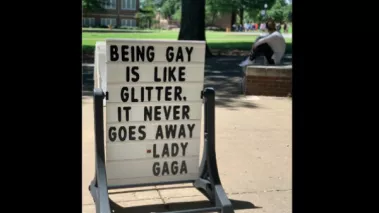Table of Contents
University of Central Arkansas censored library’s Pride Month sign after legislator complained

The sign removed from UCA’s Torreyson Library earlier this month. (@UCA_Library/Twitter)
Last week, FIRE wrote to the president of the University of Central Arkansas after he censored a Lady Gaga quote on a sign outside of the library to explain that the First Amendment protected the librarians’ right to display messages on their sign. (The quote — “Being gay is like glitter. It never goes away.” — was tied to the library’s Pride Month display and online LGBTQ+ resources.) Now, as reports emerge that the sign’s removal followed complaints by a local state legislator and university trustees, UCA is offering a dubious argument for the quote’s removal — one that’s also inconsistent with a recently-enacted campus free speech law.
John Brummett, an opinion columnist with the Arkansas Democrat-Gazette, recounted in an op-ed his phone calls with Sen. Jason Rapert and UCA President Houston Davis. Rapert, he reported, had been “given a heads-up” from someone unhappy about the sign, then called Davis to ask whether was aware of it. Davis said his taking action wasn’t a result of the state senator’s call:
The president, Dr. Houston Davis, tells me with great insistence that he did not act on Rapert’s call. Nor did he act, he said, on the subsequently expressed inquiry of a board member or two.
He acted, he said, only later that day when social media exploded with debate about the sign, and he, sensing a need to do something, instituted an inquiry into his guiding principle--his crutch, it seems--meaning established policies and procedures.
Yet records produced to Arkansas residents in response to a public records request document a discussion between members of the university’s senior leadership. The records show Davis initiates the discussion, referencing not a social media debate, but receipt of “several messages” reflecting a “complaint that it is just interest politics vs interest politics” and an “allegation that it has crossed the line of individual students, faculty or staff rights and appears to be that ‘UCA’ via the library is promoting an agenda.”
But if there was a social media uproar preceding the sign’s removal, we’re unable to find a trace of it on Twitter or Facebook. And UCA has said it has no records reflecting complaints about the sign. (UCA refused to share any records whatsoever with FIRE, as Arkansas’ public records laws only grant state citizens a right to records.)
A former dean of students explained in a Facebook post that while Davis and his family are “strong supporters of the LGBTQ community,” the “political reality” is that “university administrators’ hands, at all Arkansas institutions, are tied politically by some Arkansas legislators,” citing a 2017 threat by Arkansas lawmakers to cut Arkansas Tech’s funding because of a student organization’s “Sex on the Lawn” event.
If that evaluation is accurate, it shows that legislators’ intervention in campus discourse is having a continuing chilling effect. Arkansas’ recently-passed campus free speech statute rightly discourages public universities from limiting expression on the basis that it might be offensive to others. That goes for legislators, too.
As we reminded Davis in our second letter, sent today, there’s still time to defend expressive rights at UCA.
Recent Articles
FIRE’s award-winning Newsdesk covers the free speech news you need to stay informed.

FIRE and ACLU of TX: University of Texas must drop unconstitutional drag ban

FAQ: Responding to common questions about the fight between Harvard and the Trump administration

George Mason University calls cops on student for article criticizing Trump
